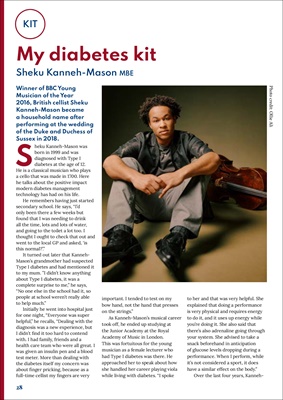
28KIT
My diabetes kit
Sheku Kanneh-Mason MBE
Winner of BBC Young
Musician of the Year
2016, British cellist Sheku
Kanneh-Mason became
a household name after
performing at the wedding
of the Duke and Duchess of
Sussex in 2018.
Sheku Kanneh-Mason was
born in 1999 and was
diagnosed with Type I
diabetes at the age of 12.
He is a classical musician who plays
a cello that was made in 1700. Here
he talks about the positive impact
modern diabetes management
technology has had on his life.
He remembers having just started
secondary school. He says, "I'd
only been there a few weeks but
found that I was needing to drink
all the time, lots and lots of water,
and going to the toilet a lot too. I
thought I ought to check that out and
went to the local GP and asked, 'is
this normal?'."
It turned out later that KannehMason's
grandmother had suspected
Type I diabetes and had mentioned it
to my mum. "I didn't know anything
about Type 1 diabetes, it was a
complete surprise to me," he says,
"No one else in the school had it, so
people at school weren't really able
to help much."
Initially he went into hospital just
for one night, "Everyone was super
helpful," he recalls, "Dealing with the
diagnosis was a new experience, but
I didn't find it too hard to contend
with. I had family, friends and a
health care team who were all great. I
was given an insulin pen and a blood
test meter. More than dealing with
the diabetes itself my concern was
about finger pricking, because as a
full-time cellist my fingers are very
important. I tended to test on my
bow hand, not the hand that presses
on the strings."
As Kanneh-Mason's musical career
took off, he ended up studying at
the Junior Academy at the Royal
Academy of Music in London.
This was fortuitous for the young
musician as a female lecturer who
had Type I diabetes was there. He
approached her to speak about how
she handled her career playing viola
while living with diabetes. "I spoke
to her and that was very helpful. She
explained that doing a performance
is very physical and requires energy
to do it, and it uses up energy while
you're doing it. She also said that
there's also adrenaline going through
your system. She advised to take a
snack beforehand in anticipation
of glucose levels dropping during a
performance. When I perform, while
it's not considered a sport, it does
have a similar effect on the body."
Over the last four years, Kanneh-